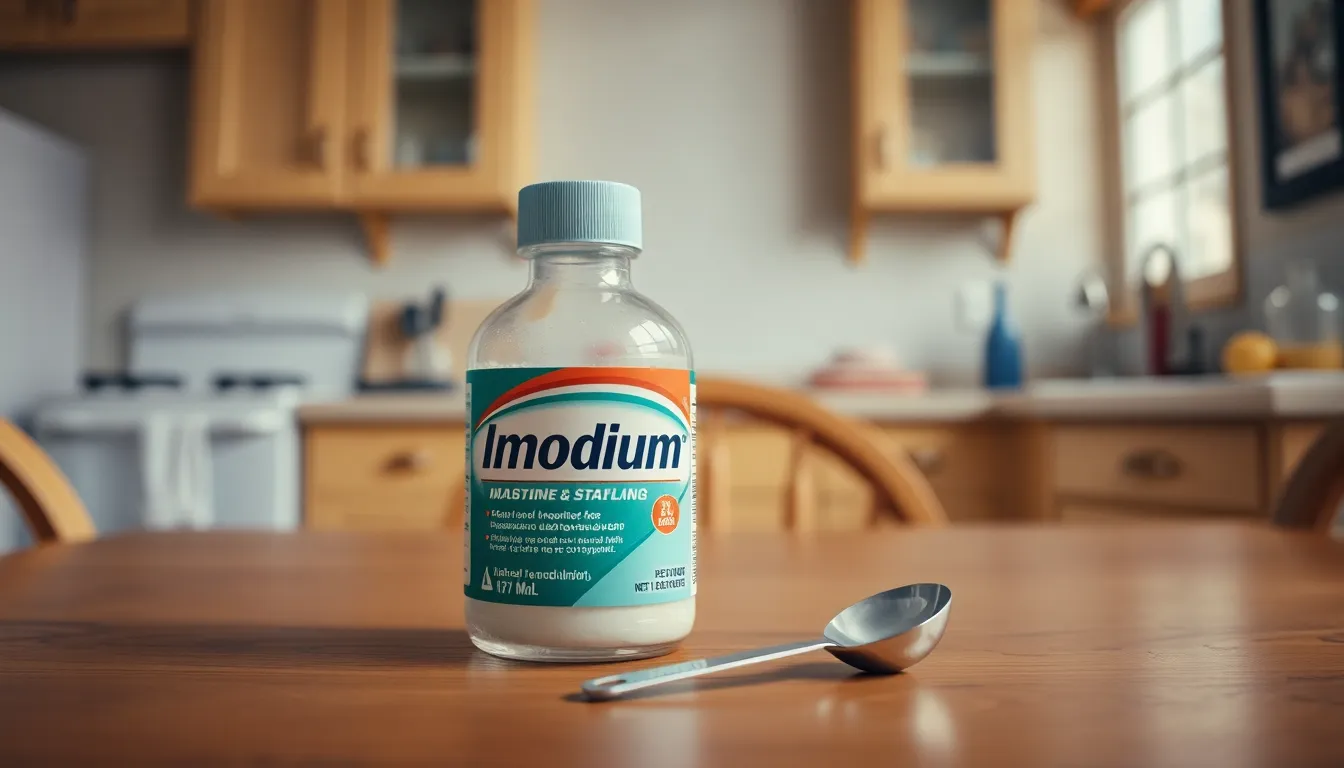Table of Contents
ToggleWhen the stomach starts doing the cha-cha and you find yourself racing to the bathroom more than you’d like, Imodium can feel like a lifesaver. But how often should one reach for this little pill of relief? It’s a question many ask when faced with the uncomfortable realities of digestive distress.
Understanding Imodium
Imodium is a widely used over-the-counter medication for managing diarrhea and related digestive issues. It’s critical to understand its function and mechanisms when considering how often to take it.
What Is Imodium?
Imodium contains loperamide as its active ingredient. This medication is designed to reduce the frequency of bowel movements. It’s effective for treating various types of diarrhea, including traveler’s diarrhea and chronic conditions. Available in tablet, capsule, and liquid forms, Imodium provides flexibility in how it’s administered. People often choose it for its rapid relief from the discomfort associated with excessive bowel movements.
How Does Imodium Work?
Imodium works by slowing down the movement in the gut. By affecting the muscles of the intestinal wall, it effectively reduces the speed at which contents move through the intestines. This action increases absorption of fluids and electrolytes, helping to form firmer stools. Users typically experience fewer urges to go to the bathroom as a result. Understand that while Imodium is effective, it should not replace proper hydration, especially during instances of severe diarrhea.
Recommended Dosage Guidelines

Following a clear dosage approach ensures effective use of Imodium. Understanding initial and maintenance dosage recommendations can aid in managing symptoms effectively.
Initial Dosage Recommendations
For adults, the initial dose of Imodium stands at 4 milligrams, usually taken after the first loose stool. If a bowel movement occurs, an additional 2 milligrams can be administered after each subsequent loose stool. This dosage applies as long as diarrhea persists but should not exceed a total of 8 milligrams in one day. For children ages 6 to 12, the initial dosing varies based on weight and age, typically starting at 2 milligrams after the first loose stool. Clearly, adhering to these guidelines helps maintain safety and efficacy.
Maintenance Dosage
Once the initial dose is established, the focus shifts to maintenance. Adults can continue to take Imodium at a rate of 2 milligrams after each loose stool, maintaining a maximum of 8 milligrams daily. Children aged 6 to 12 should follow weight-based recommendations, ensuring not to exceed the daily limits. Regular monitoring of symptoms is essential during this phase. Managing intake properly allows for effective symptom reduction without risking excessive dosage.
Factors Influencing Dosage
Various factors influence the appropriate dosage of Imodium. Age and weight play significant roles, alongside existing health conditions and concurrent medications.
Age and Weight Considerations
Children and adults metabolize medications differently, impacting their response to Imodium. For adults, the standard dosage begins with an initial 4-milligram dose, followed by 2 milligrams for each loose stool. In contrast, children aged 6 to 12 often require weight-based dosing, starting at 2 milligrams. Individual weight determines how effectively a child processes the medication, necessitating careful monitoring. Heavier children may need higher doses within the prescribed limits, while those lighter may require adjustments.
Health Conditions and Medications
Existing health conditions significantly affect Imodium’s suitability and dosage. Conditions such as liver disease may necessitate reduced dosages to prevent side effects. Concurrent medications also require attention; some may interact adversely with Imodium. For instance, certain antibiotics can provoke diarrhea, complicating treatment. Consulting a healthcare professional ensures compatibility and safety when combining treatments. Keeping track of all medications assists in assessing potential risks and necessary dosage adjustments.
Signs of Overuse
Overusing Imodium can lead to serious health complications. Recognizing the signs of overdose and understanding when to seek medical assistance is crucial for safety.
Symptoms of Imodium Overdose
Symptoms of Imodium overdose include constipation, dizziness, and drowsiness. Nausea and abdominal pain may also occur. Some may experience a rapid heart rate or difficulty breathing. If any of these symptoms arise, it’s essential to consider recent Imodium usage. Awareness of dosage taken can help identify potential issues early. Monitoring is vital for anyone using the medication, especially if exceeding recommended limits.
When to Seek Medical Attention
Individuals should seek medical attention if they experience severe symptoms after taking Imodium. Signs like extreme lethargy, persistent nausea, or severe abdominal swelling warrant immediate evaluation. Additionally, if breathing becomes labored or a rapid heart rate persists, contacting emergency services is crucial. Healthcare professionals can provide appropriate care and reduce risks associated with overdose. Fast action can prevent complications and ensure proper treatment, so don’t hesitate to seek help.
Best Practices for Taking Imodium
Taking Imodium effectively requires attention to timing and administration guidelines. Individuals should follow recommended dosages, and it’s essential to start with the initial dose after the first loose stool. Afterward, continue with smaller doses, but not more than the maximum daily limit. Timing between doses matters; wait at least two hours before taking additional medication.
Timing and Administration Tips
Timing plays a crucial role in maximizing Imodium’s effectiveness. Take the first dose as soon as diarrhea begins. Next, administer subsequent doses with care, ensuring that no more than eight milligrams are consumed in one day. Use Imodium alongside meals when possible, as food can help make it work more efficiently. Consider setting reminders to avoid early dosing, which might lead to accidental overuse.
Lifestyle Changes to Complement Treatment
Adopting specific lifestyle changes can enhance the benefits of Imodium. Staying hydrated is vital, as diarrhea can lead to dehydration. Therefore, drink plenty of water and electrolyte-rich fluids. Paying attention to food choices also helps; a bland diet can reduce irritation in the digestive system. Lastly, managing stress through practices such as mindfulness can prevent symptom aggravation during challenging times.
Understanding how often to take Imodium is crucial for effective management of diarrhea and related digestive issues. By following the recommended dosage guidelines and being mindful of individual factors like age and health conditions, users can ensure safe and effective relief. Monitoring symptoms and recognizing signs of overuse can prevent complications and enhance treatment outcomes. Staying hydrated and adopting complementary lifestyle changes can further support digestive health. Always consult a healthcare professional when in doubt to ensure the best approach for individual needs.







